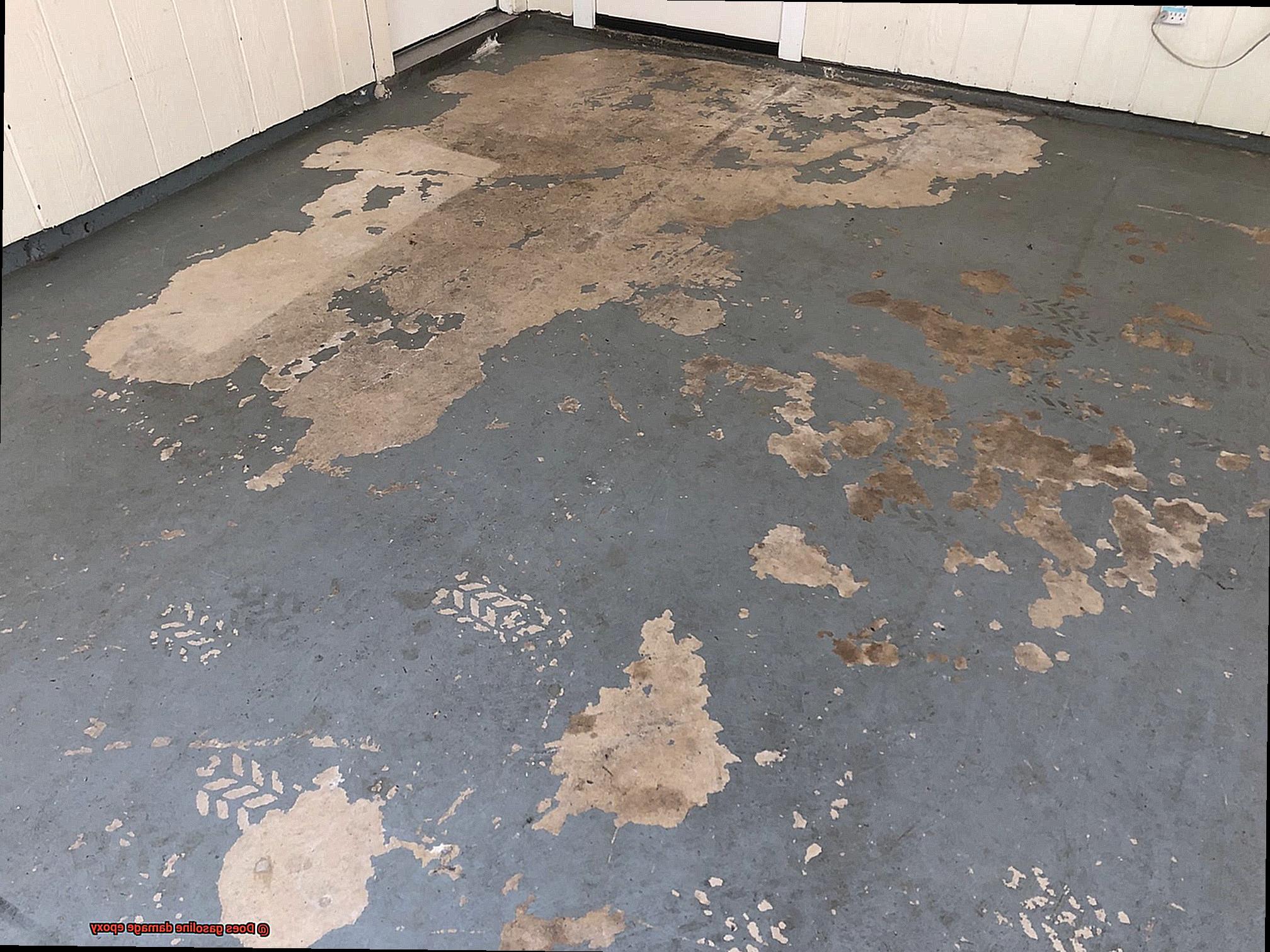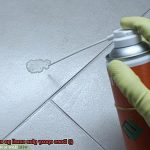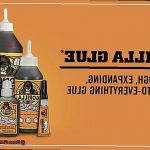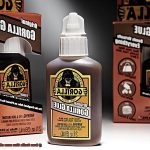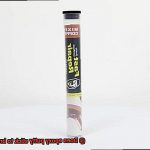Imagine this: you’re tinkering away in your garage, working on your latest DIY masterpiece, when a few drops of gasoline spill onto the floor. You quickly wipe it up, but the nagging question remains: has the gasoline ruined your beloved epoxy coating?
It’s a common concern, and for good reason. Epoxy is a popular choice for its durability and chemical resistance. But what about gasoline? Can it wreak havoc on your epoxy surfaces?
In this post, we’ll dive into the world of gasoline and epoxy. We’ll explore the properties of gasoline and how they interact with epoxy coatings. We’ll also discuss tips for preventing damage and cleaning up spills.
Whether you’re an avid DIYer or just curious about these two substances, you’ve come to the right place. By the end of this post, you’ll have all the information you need to protect your epoxy surfaces from gas-related harm.
So, let’s get started.
What is Epoxy?
Contents
- 1 What is Epoxy?
- 2 Does Gasoline Damage Epoxy?
- 3 Factors Affecting the Damage Caused by Gasoline to Epoxy
- 4 How to Minimize Risk of Damage to Epoxy When Working with Gasoline
- 5 The Chemical Composition of Gasoline and its Effects on Epoxy
- 6 Types of Epoxy and their Resistance to Gasoline
- 7 Common Applications of Epoxy in Automotive, Construction, and Woodworking Industries
- 8 Advantages of Using Epoxy over Other Adhesives
- 9 Conclusion
Epoxy is an incredibly versatile and powerful adhesive that is widely used across a range of industries, including construction, automotive, and woodworking. This thermosetting polymer is created by mixing two components – resin and hardener – in specific proportions.
Once combined, the chemical reaction results in a material that is both strong and durable.
One of the key benefits of using epoxy is its outstanding adhesion to a wide variety of materials such as metal, wood, concrete, and plastic. Plus, it has high mechanical strength and can resist water, chemicals, and heat.
Despite its numerous advantages, there are concerns about whether gasoline can damage epoxy.
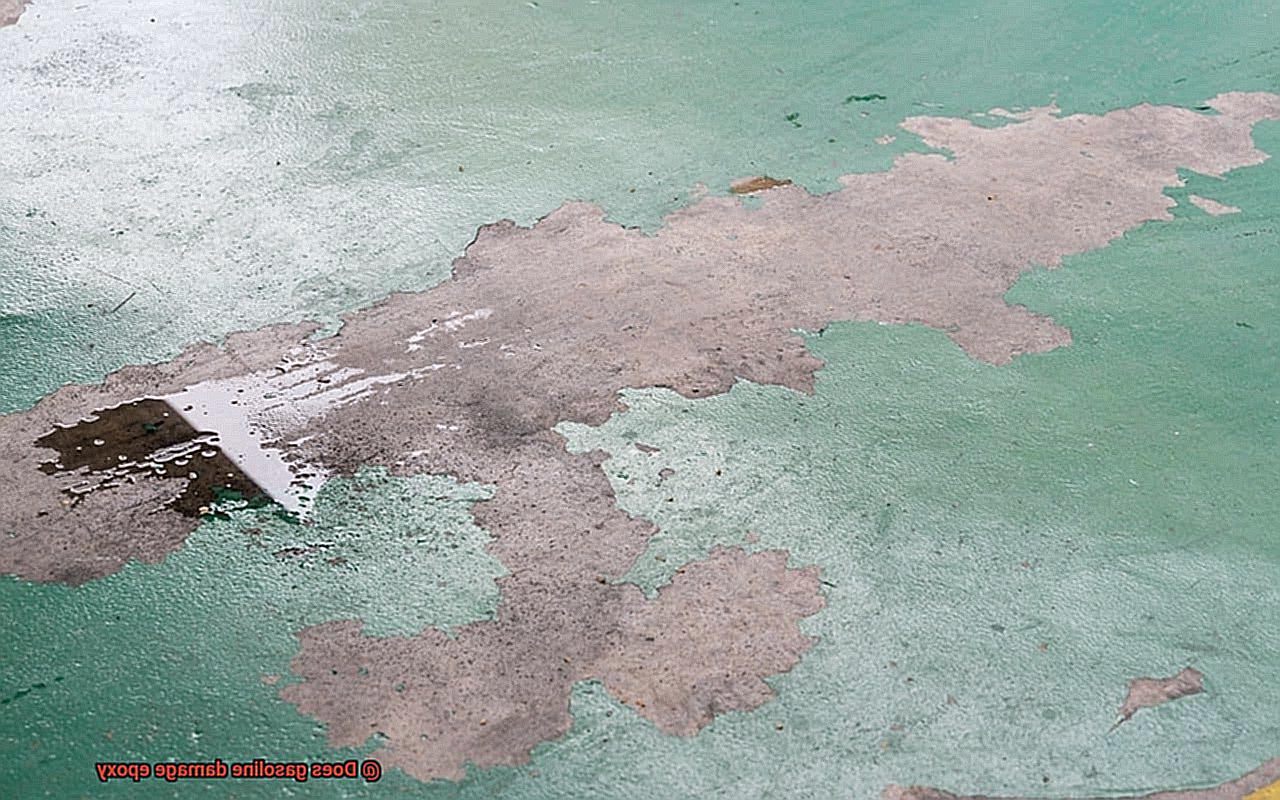
Unfortunately, gasoline can indeed harm epoxy due to its unique chemical composition. The hydrocarbons found in gasoline can react with the epoxy, causing it to lose its adhesive properties over time. This could result in cracks or brittleness.
However, there are steps you can take to minimize the risk of damage when working with epoxy in a gasoline-rich environment. First off, make sure all surfaces are clean and free from oil or other contaminants before applying epoxy.
It’s also crucial to allow sufficient time for the epoxy to cure fully before exposing it to gasoline.
It’s important to note that the extent of the damage caused by gasoline will depend on several factors such as the type of epoxy used, the concentration and duration of exposure to gasoline, and the temperature at which they come into contact.
Does Gasoline Damage Epoxy?
If you work in the automotive or marine industry, you know the importance of a strong adhesive that can withstand harsh environmental factors.
Epoxy is a popular choice due to its durability and resistance to water, heat, and chemicals. However, when it comes to gasoline, there are some important considerations to keep in mind.
Gasoline contains volatile organic compounds (VOCs) such as benzene, toluene, and xylene that can penetrate the surface of an epoxy adhesive and weaken its bond with the substrate. This can result in reduced strength, increased brittleness, and decreased resistance to moisture and UV light. So does gasoline damage epoxy? The answer is yes.
There are steps you can take to prevent this from happening.
Firstly, consider using specialized epoxy adhesives that are formulated to withstand exposure to harsh chemicals like gasoline. These adhesives have chemical-resistant properties that provide better bonding strength and durability even when exposed to gasoline.
Secondly, proper surface preparation is crucial for achieving a strong bond between the adhesive and substrate. Before applying the epoxy adhesive, make sure to thoroughly clean the surface with an appropriate solvent. This can help improve its adhesion properties and increase its resistance to gasoline.
In addition, here are some sub-topics you should be aware of:
- The extent of damage may depend on various factors such as the type of epoxy used, the duration of exposure, and the concentration of gasoline.
- Gasoline can weaken the adhesive properties of epoxy over time. This can result in reduced bonding strength and decreased resistance to environmental factors such as moisture and UV light.
- It is important to note that proper surface preparation is crucial for achieving a strong bond between the adhesive and substrate.
Factors Affecting the Damage Caused by Gasoline to Epoxy
As an expert in this field, I will share with you some fascinating insights on the factors that affect the damage caused by gasoline to epoxy.
The first critical factor is the type of epoxy used. The chemical composition of epoxy determines its resistance to gasoline and other chemicals. Epoxies containing a high percentage of hardeners and cure agents are more resistant to gasoline than those with a lower percentage. Therefore, choosing specialized epoxy adhesives designed to withstand gasoline’s effects is essential.
The duration of exposure is another significant factor that affects the damage caused by gasoline to epoxy. The more extended the exposure time, the greater the damage, resulting in reduced bond strength and delamination. Limiting the exposure time of epoxy to gasoline is necessary to maintain its durability.
The temperature at which the epoxy is exposed to gasoline is also crucial. Higher temperatures accelerate chemical reactions between gasoline and epoxy, causing significant harm. Moreover, different types of gasoline contain varying amounts of chemicals that can react differently with epoxy, further enhancing the damage caused.
Apart from these factors, humidity, pressure, and the presence of other chemicals can also affect the extent of damage caused by gasoline to epoxy.
How to Minimize Risk of Damage to Epoxy When Working with Gasoline
Epoxy is a versatile adhesive that can bond many different materials together, but when it comes into contact with gasoline, it can become weakened and less effective. To keep your epoxy projects strong and durable, you need to take some precautions when working with gasoline. Here are five tips for minimizing the risk of damage to your epoxy:
- Ensure Full Cure: Before exposing the epoxy to gasoline, make sure it has fully cured. Epoxy typically takes 24-48 hours to cure, so avoid exposing it to gasoline before that time, or else it may not be strong enough to resist the corrosive effect of gasoline.
- Keep Them Separate: Try to avoid prolonged exposure of epoxy to gasoline. If you need to work with both at the same time, keep them separate as much as possible. For example, work on a different surface that’s not exposed to gasoline and then transfer the materials onto the gasoline-contaminated surface once the epoxy has cured.
- Use Protective Coating: Applying a protective coating over the epoxy can help keep it safe from gasoline. Polyurethane coating is an excellent option as it can help block out harmful chemicals and prevent corrosion. This extra layer of protection can help maintain the strength and durability of your epoxy.
- Clean Spills Immediately: Accidents happen, and if you spill gasoline on your epoxy, clean it up immediately with a clean cloth. The longer you leave the gasoline on the epoxy, the more damage it can cause.
- Read Manufacturer’s Instructions: Always read and follow the manufacturer’s instructions for both the epoxy and gasoline products that you’re using. This will help you understand any specific requirements or precautions that you need to take when working with these materials.
The Chemical Composition of Gasoline and its Effects on Epoxy
Gasoline is a complex concoction of hydrocarbons and additives that work together to fuel vehicles and machinery. But did you know that gasoline can also have a significant impact on epoxy? Let’s delve into the intricate chemistry of gasoline and its effects on epoxy.
Gasoline typically contains an array of compounds such as benzene, toluene, xylene, and other aliphatic and aromatic hydrocarbons. When gasoline comes into contact with epoxy, the results can be unpredictable depending on the specific formulation of the epoxy and the concentration of the gasoline. Some epoxies may be more resistant to gasoline than others, while some may be completely incompatible.
One potential issue with gasoline and epoxy is that gasoline acts as a solvent, breaking down the chemical bonds that hold the epoxy together. This can cause the epoxy to soften or even dissolve over time, leading to a loss of strength and adhesion. To protect your epoxy from this kind of damage, it is crucial to take necessary precautions.
But wait, there’s more. Gasoline can also introduce other chemicals into the epoxy that can cause damage. For example, some additives in gasoline may react with the epoxy to form acidic compounds that can corrode or weaken the adhesive bond. This makes it essential to be mindful of all possible risks when working with epoxy.
To protect your epoxy from gasoline damage, here are some tips:
- Choose an epoxy that is specifically formulated for resistance to solvents and chemicals.
- Ensure that your epoxy is fully cured before exposing it to gasoline or other petroleum-based products.
- Consider using a protective coating over your epoxy to provide an extra layer of protection.
- Clean up any spills immediately to minimize the risk of damage.
If possible, avoid using epoxy in applications where it may come into contact with fuel or other petroleum-based products.
Types of Epoxy and their Resistance to Gasoline
Epoxy is a versatile adhesive that can bond various materials together. However, not all types of epoxy are created equal.
Some are more resistant to gasoline than others due to their chemical composition and application method. In this article, we will explore the different types of epoxy and their resistance to gasoline.
Two-Part Epoxy
Two-part epoxy is a widely used type of epoxy in bonding applications. However, it’s not resistant to gasoline and can break down when exposed to it for an extended period. Therefore, if you plan to use epoxy in an application that involves gasoline exposure, it’s crucial to select a specialized type that can resist gasoline.
Fuel-Resistant Epoxy
Fuel-resistant epoxy is specifically formulated to withstand prolonged exposure to gasoline and other fuels without breaking down. It’s commonly used in automotive and aviation industries where gasoline exposure is frequent. Fuel-resistant epoxy has excellent resistance to gasoline, making it ideal for fuel tanks and fuel lines.
Vinyl Ester Epoxy
Vinyl ester epoxy is a type of epoxy that’s often used in industrial settings. It has high heat resistance and is particularly resistant to chemicals like gasoline. It’s commonly used in applications where exposure to harsh chemicals is likely, such as chemical storage tanks or pipelines.
Marine-Grade Epoxy
Marine-grade epoxy is engineered explicitly for use in the marine environment. It’s formulated to resist saltwater, gasoline, and other harsh chemicals found in that environment. Marine-grade epoxy is commonly used for boat repairs and maintenance, including sealing cracks or leaks in fuel tanks.
Precautions
Although some types of epoxy are highly resistant to gasoline, prolonged exposure can still damage even the most resistant epoxies. Therefore, it’s essential to take precautions when using any type of epoxy. Ensure all surfaces are clean and free from oil or other contaminants before applying epoxy. Allow sufficient time for the epoxy to cure fully before exposing it to gasoline or other harsh chemicals.
Common Applications of Epoxy in Automotive, Construction, and Woodworking Industries
This versatile material has a broad range of applications in various industries, including automotive, construction, and woodworking. Let’s dive into the common uses of epoxy in these industries.
First up, the automotive industry. Epoxy is the go-to solution for repairing and restoring vehicles due to its excellent adhesive properties. It can bond metal, fiberglass, and plastic parts together to create a strong, durable repair. Epoxy is perfect for repairing everything from minor dents and scratches to more complex repairs like fixing broken panels.
Moving on to the construction industry, epoxy is widely used for flooring, coating, and sealing applications. Its durability and resistance to chemicals make it ideal for industrial environments where surfaces are exposed to harsh chemicals and heavy foot traffic. Epoxy coatings are also popular for concrete surfaces because they can help prevent cracking and provide a slip-resistant surface. In addition, epoxy is commonly used as an adhesive for concrete anchors, bolts, and dowels.
Lastly, in the woodworking industry, epoxy is used to fill gaps and cracks in wood, as well as for laminating and bonding wood parts together. Its strong bond makes it ideal for creating long-lasting repairs and modifications to woodwork. Epoxy can also be used as a protective coating for wooden surfaces such as tabletops, countertops, and floors.
Overall, epoxy has become an essential material in various industries due to its strength, durability, and versatility. However, when using epoxy in these industries, it’s essential to take precautions to ensure it’s fully cured before exposing it to gasoline or other harsh chemicals. Proper safety measures should always be followed when working with epoxy.
Advantages of Using Epoxy over Other Adhesives
Epoxy is a versatile adhesive that boasts numerous advantages, making it the go-to choice for many applications.
First and foremost, epoxy is incredibly strong and durable. Once cured, it forms a bond that can withstand high levels of stress and strain, making it perfect for bonding materials that will be subjected to heavy loads or frequent use. This strength is particularly useful in industrial settings where machinery and equipment require top-notch performance.
In addition to its strength, another significant advantage of using epoxy over other adhesives is its resistance to water and chemicals. Unlike other adhesives that can break down when exposed to harsh environments, epoxy maintains its strength and integrity, making it ideal for marine or automotive repairs where exposure to water and gasoline is common. This resistance also makes it a reliable option for outdoor projects where weather conditions can be unpredictable.
Epoxy also boasts excellent versatility. It can bond a wide range of materials, including metals, plastics, and wood. Whether you’re working on construction projects, woodworking, or electronics, epoxy can be used for a variety of applications. This versatility makes it a valuable tool in any toolkit.
Moreover, epoxy has excellent adhesion properties. It can bond to both porous and non-porous surfaces, making it an effective adhesive for a wide range of materials. This makes it an ideal choice for projects where you need a reliable and robust bond. Whether you’re repairing broken items or creating something entirely new, epoxy can provide the necessary strength and durability.
0oxGLd7l1Rg” >
Conclusion
In conclusion, the chemical composition of gasoline can indeed cause damage to epoxy. Volatile organic compounds (VOCs) such as benzene, toluene, and xylene found in gasoline can penetrate the surface of an epoxy adhesive and weaken its bond with the substrate. However, fear not. There are steps you can take to minimize the risk of damage when working with epoxy in a gasoline-rich environment.
To start, it’s crucial to select specialized epoxy adhesives that are formulated to withstand exposure to harsh chemicals like gasoline. Proper surface preparation is also key for achieving a strong bond between the adhesive and substrate. Before applying the epoxy adhesive, be sure to thoroughly clean the surface with an appropriate solvent.
Factors affecting the extent of damage caused by gasoline on epoxy include the type of epoxy used, duration of exposure, concentration of gasoline, temperature at which they come into contact, humidity levels, pressure and presence of other chemicals.
Epoxy has become a staple material in various industries due to its strength, durability and versatility. Its resistance to water and chemicals makes it ideal for marine or automotive repairs where exposure to water and gasoline is common. Epoxy also boasts excellent versatility as it can bond a wide range of materials including metals, plastics and wood.

